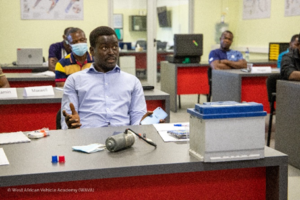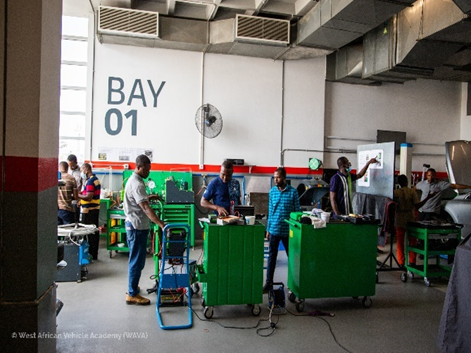The West Africa Vehicle Academy (WAVA) has officially opened to serve as a one-stop-shop for training and skills development of mechanics to address these skills-gaps.
The €1.8million investment is a joint venture of Bosch Automotive Aftermarket, Rana Motors, and German Development Cooperation GIZ aimed at developing the skills and knowledge of trainees, and equipping them to address the challenges of modern automotive services, diagnosis and repair.
Chief Operations Officer (COO), Rana Motors, Kassem Odamyat, speaking at the opening ceremony stated that modern motor vehicle systems have moved from a mechanical process to electro-mechanical with many sophisticated technologies; therefore, the outmoded mechanical ways of diagnosis are no longer effective, hence the need to train and develop the skills-set of auto-mechanics, both technical institution and private/roadside ones.
“The drive toward establishing an automotive training school was led by our strong internal belief in training and empowering our people, as well as the community at large. Secondly, we were also very much aware of the suffering in our industry with the ever-present ‘trial and error approach’ caused by uncertified mechanics who end up wasting customers’ patience, money, and time with no satisfactory outcomes in sight,” he said.

Adding to that, he emphasised Rana Motors is also eager to keep its people up-to-date with technological advancements in order to fulfil customer expectations and needs at the highest level of expertise – knowing full well that the skills and knowledge necessary are not commonly available with Ghanaian technicians from the vocational training institutions.
Furthermore, he indicated that a lot of effort went into ensuring procurement of the best equipment as well as hiring the right staff for the academy. The trainers not only have years of experience in automotive diagnosis and services, but also the needed didactical skills to get their expertise and knowledge across to the trainees.
On his part, the Regional President for Bosch (Automotive Aftermarket), Yves Nono said: “We are gathered at this state-of-the-art facility called WAVA, where mechanics are acquiring and upgrading skills for modern vehicle service, diagnosis and repair in Ghana and the sub-region.
“The automobile industry in Africa is young and has a huge potential. It is the backbone of our industrial drive, and we want to improve vehicle safety on roads by training mechanics to be able to diagnose and service vehicles properly.”
With government’s objective of making the country an automobile hub, the WAVA state-of-the-art facility at Rana Motors is projected to boost the country’s automotive industry as a competitive sub-regional hub.
As of now, WAVA trains technicians from the Rana Motors Service Network, Bosch Service Network and trainers/instructors from public and private technical schools and universities. However, plans are far advanced to open up these courses to the broader public, including individuals, students and service partners from other carmakers.
Taking her turn, Head of Cooperation-German Embassy, Dorothee Dinkelaker, stated that the German development cooperation does not only support the automotive sector because Germany is a country of car lovers and a worldwide hub for car manufacturing, but are very much looking at the sector from a job-creation perspective.
“As a German, you know almost automatically what significance the automotive sector can have economically. The key to this is, of course, a high level of value creation in the country. Establishment of the first assembly plants is a very exciting development in that regard, and a starting point and anchor for further expansion of the value chain and the emergence of a local supplier industry,” she said.










